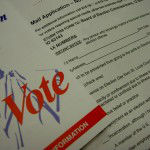Will Upcoming Voting Rights Act Case Rest on the Elections Clause?

The U.S. Supreme Court saved the best for last, as it is poised to take on its most controversial cases in the coming weeks. The first case on deck is Shelby County v. Holder, which will reexamine the constitutionality of Voting Rights Act.
While the Court’s grant focuses on issues related to the Fourteenth and Fifteenth Amendments to the Constitution, seven constitutional scholars have argued in an amicus brief that the Court should also consider Congress’s broad power to regulate congressional elections under the Elections Clause of the Constitution.
The Election Clause, which can be found in Article I, Section 4, Clause 1 of the Constitution, provides:
The times, places and manner of holding elections for Senators and Representatives, shall be prescribed in each state by the legislature thereof but the Congress may at any time by law make or alter such regulations, except as to the places of choosing Senators.
Thus, the elections scholars argue that the Fourteenth and Fifteenth Amendments are not and have never been the sole source of Congress’ authority for Section 5 of the Voting Rights Act. Rather, the Elections Clause offers clear authority for Congress to oversee how states implement federal elections. As the brief highlights, “The Framers’ principal purpose in adopting the Elections Clause was to empower the federal government to prevent efforts to undermine or corrupt the elections process for federal officials.”
The scholars further argue that the Supreme Court has consistently interpreted Congress’ power under the Election Clause very broadly. The brief cites Ex parte Siebold, 100 U.S. 371, 388 (1879), which found that Congress enjoys “general supervisory power over the whole subject” of federal elections.
The amici further maintain that Congress’ power under the Elections Clause is not qualified by the principle of state sovereignty. They point to Cook v. Gralike, 531 U.S. 510, 514 (2001), which found that although the Elections Clause provides a procedural role for the states in federal elections, “the acknowledgement of that role is neither a recognition nor a grant of sovereign authority to the states over federal elections.”
The Elections Clause clearly provides a narrow and clear basis for rejecting the current facial challenge to the Voting Rights Act. It also allows the Supreme Court to render a decision without considering the more complicated and controversial issue of Congress’ authority under the Fourteenth and Fifteenth Amendments. It will be interesting to see if the justices take the bait.
Previous Articles
SCOTUS Decision in Bowe v. United States Is First of the 2026 Term
by DONALD SCARINCI on February 5, 2026
In Bowe v. United States, 607 U.S. ___ (2026), the U.S. Supreme Court held that Title 28 U.S.C. § ...
SCOTUS Rules State Can’t Immunize Parties from Federal Civil Liability
by DONALD SCARINCI on January 29, 2026
In John Doe v. Dynamic Physical Therapy, LLC, 607 U.S. ____ (2025) the U.S. Supreme Court held that...
Supreme Court to Address Racial Discrimination in Jury Selection
by DONALD SCARINCI onWhile the U.S. Supreme Court has concluded oral arguments for the year, it continues to add cases t...
The Amendments
-
Amendment1
- Establishment ClauseFree Exercise Clause
- Freedom of Speech
- Freedoms of Press
- Freedom of Assembly, and Petitition
-
Amendment2
- The Right to Bear Arms
-
Amendment4
- Unreasonable Searches and Seizures
-
Amendment5
- Due Process
- Eminent Domain
- Rights of Criminal Defendants
Preamble to the Bill of Rights
Congress of the United States begun and held at the City of New-York, on Wednesday the fourth of March, one thousand seven hundred and eighty nine.
THE Conventions of a number of the States, having at the time of their adopting the Constitution, expressed a desire, in order to prevent misconstruction or abuse of its powers, that further declaratory and restrictive clauses should be added: And as extending the ground of public confidence in the Government, will best ensure the beneficent ends of its institution.





